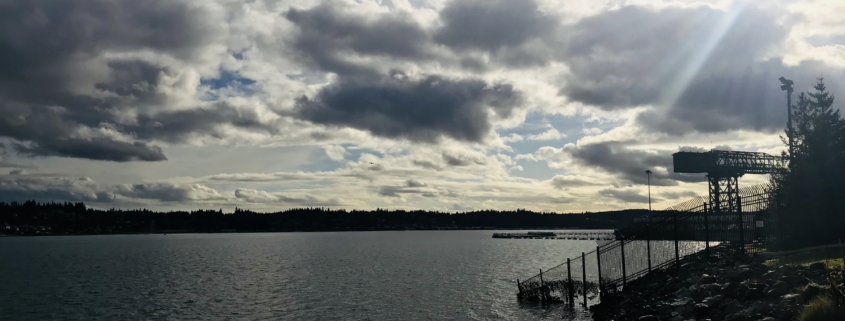Cartographer
I am in constant pursuit of an escape route.
Since my father’s passing in 2012, I have moved a total of seven times. Arizona to California, up to Idaho and back down to Phoenix again. My living map is a zig-zag of dots and scattered lines spanning the western US. This February, I relocated my family yet again to Washington. I am on a constant quest for physical space to lovingly forgive my mental state. Nearly one year to the date of the assault I detailed in my last blog, I departed the place where I have spent the majority of my life and started a three-day long drive to my new home in the Pacific Nort hwest.
hwest.
I so deeply crave the ability to settle. To rest.
* * *
At eleven, I was diagnosed with post-traumatic stress disorder. When my family uprooted me from my central California home in 1997, they were unaware of the cognitive destruction this move would cause—a child, ultimately brought within significantly closer physical boundaries to a predator. For years, my grandmother’s husband and resident “good guy” had been covertly abusing and subsequently threatening me during extended stays and family vacations. Young, confused, and fearful, I abided by my parents decision to relocate to Arizona to be closer to loved ones. Nearly all of my relatives had shifted from central and northern California over the years. My parents decided it was due time to make the transition themselves and thus, our unit of three came to the desert, a mere fifty miles from the home of my abuser.
In a poem I published last year about this particular home, I wrote about the vivid connection to this physical space and the devastation of the memories associated:
The streets of my hometown are lined with brooding palms, dying in summer sun. The heat—sucking moisture from blades of grass, sucking souls, sucked my memory dry.
…In Kingswood Parke there is a house seething with sin, shelled memories of innocence line the halls, discarded. In this house my parents raised a child who never learned what childhood meant. A house where no room felt safe. I shifted. Front room. Guest room. Den.
After he left I would find him. Linger. Linger. Meds on my tongue. Every boy in my bed. Every failed attempt at counseling, healing. Flashbacks. Convulsions. Hospitals. Broken hearts. Broken bones. Broken promises. Broken home. Haunt knows no boundaries.
There is no median between the pressure of his flesh on mine and this plague that refuses to come undone.
After relocating, our visits increased in frequency. The abuse became more intense. My memories of this childhood home are stark, clogged with the sensations of this tragedy. I can still recount every room, every step I made in that house, the places I tried to hide, and the bed where I held back tears and pretended to be asleep before I was finally able to build up the courage to tell my parents what had been going on. My memories are so vivid that, in a split-second, I can find myself back in that physical space. Every sensory detail reconstructed with unwarranted precision.
* * *
Sufferers of PTSD experience a wide array of symptoms. Particularly, I find myself smothered by the ironically ever-present tactic of avoidance. After experiencing traumatic events, our instinct is to bypass any and all associations to the circumstance as an effort to escape a potential flashback. We avoid sights, sounds, smells, and the sheer presence of any connection to the matters that entangle themselves in our torment.
Phoenix had become my own personal hellhole. A clusterfuck of landmines, buried at every crossroad.
 I spent nearly twenty years in Arizona. My memory had transformed the metropolitan area into a landscape of dangerous relationships, physical trauma, illness, multiple breakdowns, and the deaths of family members, close friends, and my own father. The hurt was relentless.
I spent nearly twenty years in Arizona. My memory had transformed the metropolitan area into a landscape of dangerous relationships, physical trauma, illness, multiple breakdowns, and the deaths of family members, close friends, and my own father. The hurt was relentless.
My partner and I mapped out my days. I desperately sought to avoid anything with a single tie to pain or traumatic experience. I stayed at home when my daughter and husband went out. Drove out of my way to avoid situations and spaces I anticipated may be anxiety-inducing. Homes. Workplaces. Restaurants. Roads. Television programs. Music. Things I once loved, I fled from. I felt the looming presence of monsters encircling every space I inhabited, clawing at my skin. I lived a life in practical hiding, in the place that terrified me most. In my apartment. In the depth of my mind.
* * *
I have long been consumed by control. Control of the things I can and cannot often control. I am engaged in a constant wrestling match with my own willpower. In my own misguided measures of control I have tested my own ability to withstand. I sit complacent in toxic dynamics in an attempt to control and soften those who sought to hurt me. Other times, I flat out abstain from circumstances I fear have the capability of inflicting a speck of pain. My results, nonetheless, are ingrained in reality. I cannot escape the present, regardless of effort.
For most of my life, I have fought to regain the control that began slipping from my palms as a child.
* * *
Shortly after making my way to Washington, I overheard my father-in-law binge-watching one of his favorite shows, Jessica Jones, in the living room; a show I was previously unfamiliar with. As I stood in the adjacent kitchen with my husband, I overheard the following scene play out:
Kilgrave: “We used to do a lot more than just touch hands.”
Jessica: “Yeah. It’s called rape.”
Kilgrave: “What? Which part of staying in five-star hotels, eating at all the best places, doing whatever the hell you wanted, is rape?”
Jessica: “The part where I didn’t want to do any of it! Not only did you physically rape me, but you violated every cell in my body and every thought in my goddamn head.”
Kilgrave: “That is not what I was trying to do.”
Jessica: “It doesn’t matter what you were trying to do. You raped me again and again and again—”
Flashback. Flashback. Flashback. The dialogue on instantaneous loop.
Stop fucking chasing me.
I was angry.
I made the move to Washington to avoid this. The memories. The pain. I was still high on the impact of arrival. Why was this happening in the place where I sought to be safe?
I briskly departed the downstairs quarters and threw myself face first onto my pillow—sobbing, silent, distressed. Another trigger in an all-too-real, constant conversation about sexual abuse in our country.
As a survivor, I want justice. I want to speak. I want to hear. As a survivor, it’s also something like playing a game of Russian roulette every time I engage with media.
* * *
Another thing to know about me: I’m terrible at taking my own advice.
In my writing, I do my best to make clear, conscious decisions. When I wrote the above aforementioned poem, Exiting Bell Road, I decided to interject the words, “Haunt knows no boundaries.” Why? Because I knew what I was talking about, I’ve just been too stubborn to listen to myself. I cannot, no matter how hard I try, avoid this.
My life has been a series of patterns. My father, the depressive. The angry. The kind. My mother, the worrier. The lover. My husband and I have the same arguments, twelve years after we first met. I listen to the same music I did at seventeen. I can eat the same handful of meals every night for months. I tuck my daughter in with the same song and “hugs and kisses and rubs” every night at the same time. I over-apologize. I over-indulge. I attempt to overrun the pain, the present. As much as I wish to wake up to an alternative, I cannot avoid my existence.
The loop, again.
I am a creature of habit. My mental state still makes its way into my writing, scaling the lines of my poems—blunt-forcing its way into this essay.
When I come face to face with the gravity of fear, I flee.
* * *
My ever-expanding map has become a safety mechanism. In my efforts to feed this craving to settle, I also have become the orchestrator of my failed attempts at avoidance. I have successfully run out of places to hide and I think for once, I’m okay with this.
I am a constant work in progress.
For now, I am trying to teach myself to see through to the end of the waves before they come crashing in at full force. If I know my trauma will always be a blaring siren, can I embrace the moments where it is a dull murmur in the distance? Can I learn to truly live in these moments? Maybe we don’t always have to choose between fight or flight. Is it possible to interrupt this polarity? It seems beginning to understand these patterns, this constant shapeshifting, is a step to the settling I crave.
My new home sits amongst the trees, deep in a forest encased by the Puget Sound. It is a humble home, filled with family. A place of relearning and discovery. A place so close to this body of water that reminds me each day of its epic beauty and power. I feel minuscule and happy to be so. My trauma still remains tethered, however, I am learning to breathe in the moments where I can locate calm, even momentarily.
Today, I sit at the edge of the water, embracing the potential to stay.
 Doni Shepard is a poet, mother, and lifetime learner currently residing in Washington. She spends her days working as an educational director, mommying an extraordinary four-year-old, and serving on Lunch Ticket, where she has held a laundry list of positions over the last two and a half years. Upon nightfall you can generally find her in an insomniac haze binge-watching streaming television with a fluffy orange feline named Doobie James. Her poetry, personal essays, and journalism have been featured online by Lunch Ticket, Dirty Chai, Bloodletters Literary Magazine, Calamus Journal, Crab Fat Magazine, The Thought Erotic, and Ursus Americanus Press and can be found in the print-based love anthology Spectrum 3: LoveLoveLove. She holds an undergraduate degree in Interdisciplinary Studies with a concentration in art therapy from Arizona State University and is currently working on completing her MFA in Creative Writing at Antioch University Los Angeles, concentrating in poetry.
Doni Shepard is a poet, mother, and lifetime learner currently residing in Washington. She spends her days working as an educational director, mommying an extraordinary four-year-old, and serving on Lunch Ticket, where she has held a laundry list of positions over the last two and a half years. Upon nightfall you can generally find her in an insomniac haze binge-watching streaming television with a fluffy orange feline named Doobie James. Her poetry, personal essays, and journalism have been featured online by Lunch Ticket, Dirty Chai, Bloodletters Literary Magazine, Calamus Journal, Crab Fat Magazine, The Thought Erotic, and Ursus Americanus Press and can be found in the print-based love anthology Spectrum 3: LoveLoveLove. She holds an undergraduate degree in Interdisciplinary Studies with a concentration in art therapy from Arizona State University and is currently working on completing her MFA in Creative Writing at Antioch University Los Angeles, concentrating in poetry.






